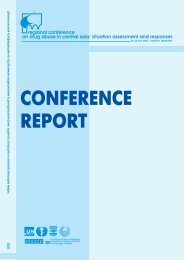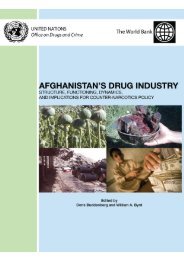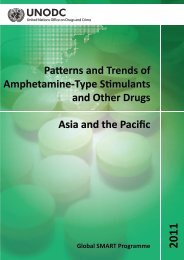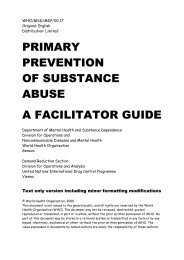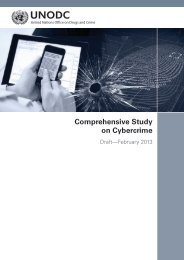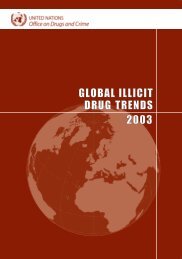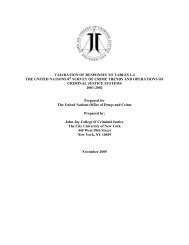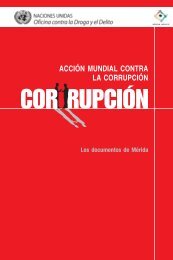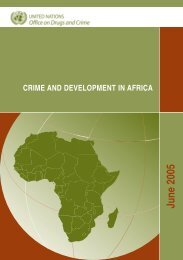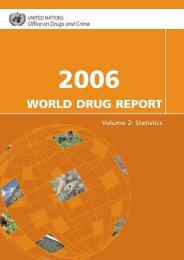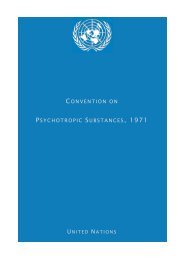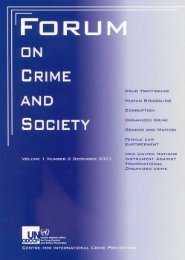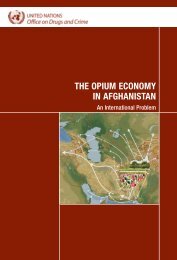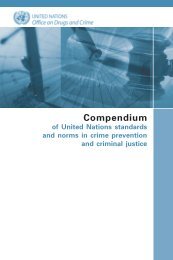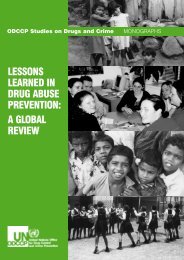Drug abuse in Pakistan - United Nations Office on Drugs and Crime
Drug abuse in Pakistan - United Nations Office on Drugs and Crime
Drug abuse in Pakistan - United Nations Office on Drugs and Crime
Create successful ePaper yourself
Turn your PDF publications into a flip-book with our unique Google optimized e-Paper software.
BACKGROUND<br />
<str<strong>on</strong>g>in</str<strong>on</strong>g>jecti<strong>on</strong> of hero<str<strong>on</strong>g>in</str<strong>on</strong>g> was reported. The hero<str<strong>on</strong>g>in</str<strong>on</strong>g> addicts<br />
came from various backgrounds rang<str<strong>on</strong>g>in</str<strong>on</strong>g>g from workers<br />
with post-graduate qualificati<strong>on</strong>s to illiterate<br />
women. Women were <str<strong>on</strong>g>in</str<strong>on</strong>g>troduced to hero<str<strong>on</strong>g>in</str<strong>on</strong>g> at an<br />
average age of 22 years ma<str<strong>on</strong>g>in</str<strong>on</strong>g>ly through friends, husb<strong>and</strong>s<br />
<strong>and</strong> relatives. Peer pressure <strong>and</strong> a stressful<br />
life were frequently menti<strong>on</strong>ed as causes for hero<str<strong>on</strong>g>in</str<strong>on</strong>g><br />
<str<strong>on</strong>g>abuse</str<strong>on</strong>g>. Five out of the 32 hero<str<strong>on</strong>g>in</str<strong>on</strong>g> us<str<strong>on</strong>g>in</str<strong>on</strong>g>g women had<br />
been arrested at least <strong>on</strong>ce. Women menti<strong>on</strong>ed that<br />
they found it difficult to receive treatment or counsell<str<strong>on</strong>g>in</str<strong>on</strong>g>g<br />
<strong>on</strong> drug <str<strong>on</strong>g>abuse</str<strong>on</strong>g> as n<strong>on</strong>e of the established<br />
treatment centres provide specialized services for<br />
women.<br />
Overall, drug addicts have little access to effective<br />
treatment. With a few excepti<strong>on</strong>s the services provided<br />
by government-run drug treatment facilities<br />
are limited to the management of acute withdrawal<br />
symptoms of 7-10 days durati<strong>on</strong>. Most of the drug<br />
treatment facilities <str<strong>on</strong>g>in</str<strong>on</strong>g> the public sector are situated<br />
with<str<strong>on</strong>g>in</str<strong>on</strong>g> the departments of psychiatry <str<strong>on</strong>g>in</str<strong>on</strong>g> teach<str<strong>on</strong>g>in</str<strong>on</strong>g>g or<br />
district headquarters hospitals. The staff with<str<strong>on</strong>g>in</str<strong>on</strong>g><br />
these facilities are tra<str<strong>on</strong>g>in</str<strong>on</strong>g>ed <str<strong>on</strong>g>in</str<strong>on</strong>g> psychiatry <strong>and</strong> therefore<br />
largely view addictive behaviour from this perspective.<br />
Specialist tra<str<strong>on</strong>g>in</str<strong>on</strong>g><str<strong>on</strong>g>in</str<strong>on</strong>g>g <str<strong>on</strong>g>in</str<strong>on</strong>g> the management of<br />
substance misuse problems is rare. NGOs differ <str<strong>on</strong>g>in</str<strong>on</strong>g><br />
levels of development <strong>and</strong> capacity <str<strong>on</strong>g>in</str<strong>on</strong>g> terms of provid<str<strong>on</strong>g>in</str<strong>on</strong>g>g<br />
drug treatment. Generally, NGOs are more<br />
receptive to develop<str<strong>on</strong>g>in</str<strong>on</strong>g>g new broader treatment<br />
resp<strong>on</strong>ses <strong>and</strong> provid<str<strong>on</strong>g>in</str<strong>on</strong>g>g a range of services bey<strong>on</strong>d<br />
medical <str<strong>on</strong>g>in</str<strong>on</strong>g>terventi<strong>on</strong>s to their clients. However,<br />
aga<str<strong>on</strong>g>in</str<strong>on</strong>g> staff often are not specially tra<str<strong>on</strong>g>in</str<strong>on</strong>g>ed <strong>and</strong> there<br />
is a need to develop a better underst<strong>and</strong><str<strong>on</strong>g>in</str<strong>on</strong>g>g of the<br />
issues <str<strong>on</strong>g>in</str<strong>on</strong>g> offer<str<strong>on</strong>g>in</str<strong>on</strong>g>g <str<strong>on</strong>g>in</str<strong>on</strong>g>terventi<strong>on</strong>s such as social <strong>and</strong><br />
vocati<strong>on</strong>al rehabilitati<strong>on</strong>. Only very few well established<br />
NGO <strong>and</strong> private cl<str<strong>on</strong>g>in</str<strong>on</strong>g>ics offer comprehensive<br />
treatment packages <str<strong>on</strong>g>in</str<strong>on</strong>g>clud<str<strong>on</strong>g>in</str<strong>on</strong>g>g rehabilitati<strong>on</strong> <strong>and</strong><br />
social re<str<strong>on</strong>g>in</str<strong>on</strong>g>tegrati<strong>on</strong> services, but these services often<br />
are too expensive for the average street addict to<br />
access. Whilst no systematic follow-up is d<strong>on</strong>e <strong>on</strong><br />
the success of treatment, readmissi<strong>on</strong> of relapse<br />
cases <str<strong>on</strong>g>in</str<strong>on</strong>g> public <str<strong>on</strong>g>in</str<strong>on</strong>g>stituti<strong>on</strong>s are reported to be as<br />
high as 90%.<br />
It is estimated that approximately 20% of <str<strong>on</strong>g>Pakistan</str<strong>on</strong>g>’s<br />
pris<strong>on</strong> populati<strong>on</strong> has been <str<strong>on</strong>g>in</str<strong>on</strong>g>carcerated because of<br />
drug <str<strong>on</strong>g>abuse</str<strong>on</strong>g>, possessi<strong>on</strong> of drugs <strong>and</strong> other drugrelated<br />
offences. Many young drug addicts f<str<strong>on</strong>g>in</str<strong>on</strong>g>d<br />
themselves <str<strong>on</strong>g>in</str<strong>on</strong>g> pris<strong>on</strong> because their family members<br />
were unable to cope with their addicti<strong>on</strong> <strong>and</strong><br />
arranged for their impris<strong>on</strong>ment. Treatment services<br />
<str<strong>on</strong>g>in</str<strong>on</strong>g> pris<strong>on</strong>s, if available, are limited to medical <str<strong>on</strong>g>in</str<strong>on</strong>g>terventi<strong>on</strong><br />
to br<str<strong>on</strong>g>in</str<strong>on</strong>g>g relief from acute withdrawal symptoms.<br />
Pris<strong>on</strong> authorities admit that they do not have<br />
the capacity to properly deal with the problem of<br />
drug addicts.<br />
Relatively little research has been d<strong>on</strong>e <strong>on</strong> the c<strong>on</strong>sequences<br />
of drug <str<strong>on</strong>g>abuse</str<strong>on</strong>g> <str<strong>on</strong>g>in</str<strong>on</strong>g> the country. There are<br />
no official statistics or reliable reports available <strong>on</strong><br />
the socio-ec<strong>on</strong>omic impact of drug <str<strong>on</strong>g>abuse</str<strong>on</strong>g>, drugrelated<br />
deaths or drug-related violence. Very recent<br />
reports <str<strong>on</strong>g>in</str<strong>on</strong>g>dicate the availability of high purity<br />
hero<str<strong>on</strong>g>in</str<strong>on</strong>g> <str<strong>on</strong>g>in</str<strong>on</strong>g> some of <str<strong>on</strong>g>Pakistan</str<strong>on</strong>g>’s drug-markets, which<br />
has caused several deaths am<strong>on</strong>g drug users.<br />
Generally, however, the purity of hero<str<strong>on</strong>g>in</str<strong>on</strong>g> available to<br />
street addicts <str<strong>on</strong>g>in</str<strong>on</strong>g> <str<strong>on</strong>g>Pakistan</str<strong>on</strong>g> is believed to be quite low.<br />
However c<strong>on</strong>siderable geographical <strong>and</strong> temporal<br />
variati<strong>on</strong> may exist <str<strong>on</strong>g>in</str<strong>on</strong>g> the compositi<strong>on</strong> of hero<str<strong>on</strong>g>in</str<strong>on</strong>g><br />
available <strong>on</strong> the illicit market. As this factor may<br />
directly <str<strong>on</strong>g>in</str<strong>on</strong>g>fluence the nature of drug <str<strong>on</strong>g>abuse</str<strong>on</strong>g> problems<br />
<str<strong>on</strong>g>Pakistan</str<strong>on</strong>g> is faced with, there is a need to develop<br />
methods for m<strong>on</strong>itor<str<strong>on</strong>g>in</str<strong>on</strong>g>g the compositi<strong>on</strong> of drugs<br />
<strong>on</strong> the illicit market. This topic is returned to <str<strong>on</strong>g>in</str<strong>on</strong>g> a<br />
later part of this report.<br />
Status of c<strong>on</strong>venti<strong>on</strong> adherence<br />
<str<strong>on</strong>g>Pakistan</str<strong>on</strong>g> is a signatory to the <str<strong>on</strong>g>United</str<strong>on</strong>g> <str<strong>on</strong>g>Nati<strong>on</strong>s</str<strong>on</strong>g> S<str<strong>on</strong>g>in</str<strong>on</strong>g>gle<br />
C<strong>on</strong>venti<strong>on</strong> <strong>on</strong> Narcotic <str<strong>on</strong>g>Drug</str<strong>on</strong>g>s, 1961, the 1971<br />
C<strong>on</strong>venti<strong>on</strong> <strong>on</strong> Psychotropic Substances <strong>and</strong> the<br />
1988 <str<strong>on</strong>g>United</str<strong>on</strong>g> <str<strong>on</strong>g>Nati<strong>on</strong>s</str<strong>on</strong>g> C<strong>on</strong>venti<strong>on</strong> aga<str<strong>on</strong>g>in</str<strong>on</strong>g>st Illicit<br />
Traffic <str<strong>on</strong>g>in</str<strong>on</strong>g> Narcotic <str<strong>on</strong>g>Drug</str<strong>on</strong>g>s <strong>and</strong> Psychotropic Substances.<br />
In February 1999, the Government agreed<br />
to ratify the 1972 Protocol, which amends the 1961<br />
C<strong>on</strong>venti<strong>on</strong>.<br />
Legislati<strong>on</strong><br />
The C<strong>on</strong>trol of Narcotic Substances (CNS) Act, 1997,<br />
aris<str<strong>on</strong>g>in</str<strong>on</strong>g>g from an ord<str<strong>on</strong>g>in</str<strong>on</strong>g>ance bear<str<strong>on</strong>g>in</str<strong>on</strong>g>g the same name<br />
<strong>and</strong> promulgated <str<strong>on</strong>g>in</str<strong>on</strong>g> 1995, effectively covers all<br />
aspects of <str<strong>on</strong>g>Pakistan</str<strong>on</strong>g>’s drug c<strong>on</strong>trol efforts. It deals<br />
with cultivati<strong>on</strong>, manufacture, producti<strong>on</strong>, traffick<str<strong>on</strong>g>in</str<strong>on</strong>g>g<br />
<strong>and</strong> possessi<strong>on</strong> offences as well as with treatment<br />
<strong>and</strong> rehabilitati<strong>on</strong> of drug addicts (see below). The<br />
5



